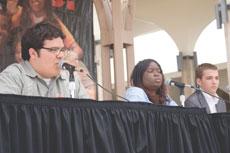 Kelly Calligan, Assistant Photo Editor
Kelly Calligan, Assistant Photo EditorIn the council chambers and in the picket lines, many San Diego State students have used “more free speech on campus” as their call to arms this past semester. Now, after months of pushing, University Senate has taken notice, and policies dating back several decades may be altered in the coming months.
William Eadie, a member of a special Senate committee investigating free speech policy, spoke to Associated Students last Wednesday about a revision that promises to fall on the side of freedom of expression. But the Senate committee went a step further the following day when it made a preliminary decision to recommend the abolition of free speech zones on campus.
If approved by a vote in the Senate and not vetoed by SDSU President Stephen Weber, open expression would no longer be relegated to the Free Speech Steps but expanded throughout campus.
“Having one small area is too restrictive, and comments have been made in the committee that our current policy would not stand up to a legal test if somebody brought a lawsuit against us,” Eadie said. “Essentially we are a public institution, this is public property, and court cases say that public property is among the best places for free expression.”
The free speech movement on campus began on Oct. 12 when University Police interrupted a Dia de la Raza celebration organized by Movimiento Estudiantil Chicano/a de Aztlan because of a noise violation. The police later admitted it was a mistake for officers to pull the plug on the event, which had been issued a permit, but the University Police department did not apologize for the incident as MEChA requested.
The situation escalated a few days later when University Police attempted to put a lid on a small protest organized by the Campus Anti-War Network near Love Library. This set off a series of protests not only challenging University Police but also the legitimacy of the free speech zone policy as a whole.
Free speech zones date back to the 1960s when administrators tried to find a way to keep protesters from disrupting classes. But many activists cried foul, and have long claimed the zones were a way to control and marginalize student voices.
David Flores, the MEChA representative for A.S., expressed his fears to the council that new policies would be useless unless University Police could be punished for breaking them.
“No matter what type of draft we put up, if the police are not on (board) or don’t know everything about the policy, then it has no teeth,” Flores said. “The campus police need to be accountable to someone, and I think that should be mentioned in the policy.”
A.S. President Chris Manigault fielded the concern and said he was working with University Police Chief John Browning to form a committee to ensure that officers receive education of free speech issues.
“What happened, happened,” Manigault said. “But we’re trying to make sure that it doesn’t happen again.”
The proposed policy changes are deliberately vague to give an overview of the university’s stance on free speech. However, the Senate committee will compose recommendations of how to interpret their text to make specific regulations.
“It’s an attempt to try and get people to think broadly about how freedom of expression should be conceptualized on campus,” Eadie said, “and to state a philosophy about resolving disputes over freedom of expression because there’s always going to be disputes.”
Despite the early findings of the committee, a general vote in the Senate is not expected until May 12.






